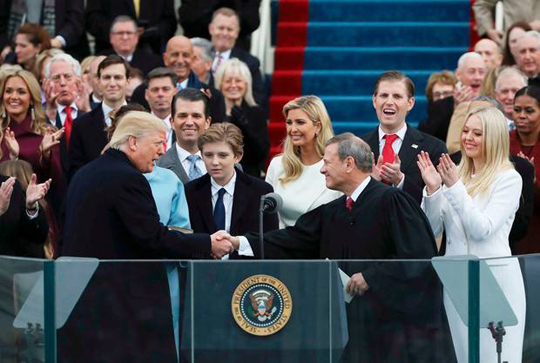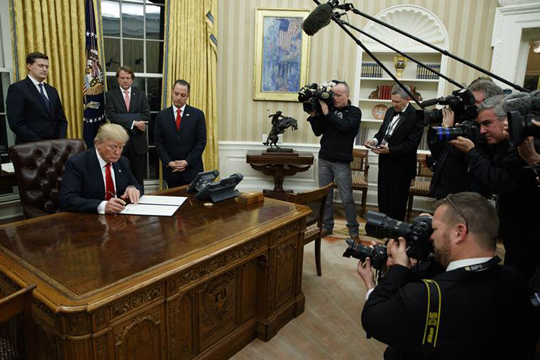Washington, Jan 21: Donald Trump was sworn in as the 45th president of the United States on Friday, succeeding Barack Obama and telling a bitterly divided country he will pursue “America First” policies at home and abroad.

As scattered protests erupted elsewhere in Washington, Trump raised his right hand and put his left on a Bible used by Abraham Lincoln and repeated a 35-word oath of office from the US Constitution, with US Chief Justice John Roberts presiding.
Afterward, he stretched his arms wide and hugged his wife, Melania, and other members of his family. Then he turned around to a podium and delivered his inaugural address.
“This moment is your moment, it belongs to you,” Trump told a large crowd that had earlier booed Chuck Schumer, the Democratic minority leader in the US Senate.
Revisiting themes from his improbable campaign victory, Trump said his presidency would aim to help struggling middle-class families, build up the US military and strengthen US borders.

“We are transferring power from Washington D.C. and giving it back to you,” he said.
“From this day forward a new vision will govern our land,” Trump said. “From this day forward it's going to be only America First.”
The transition from a Democratic president to a Republican took place on the West Front of the domed US Capitol before a crowd of former presidents, dignitaries and hundreds of thousands of people on the grounds of the National Mall. The crowd stretched westward on a cool day of occasional light rain.
Trump, 70, takes over a country divided after a savage election campaign. A wealthy New York businessman and former reality TV star, he will set the country on a new, uncertain path at home and abroad.
Away from the Capitol, masked activists ran through the streets smashing windows with hammers at a McDonald's restaurant, a Starbucks coffee shop and Bobby Van's Grill steakhouse several blocks from the White House.
They carried black anarchist flags and signs that said, “Join the resistance, fight back now.” Police used pepper spray and chased them down a major avenue, a Reuters eyewitness reported.
In another location not far from the White House, protesters also scuffled with police, at one point throwing aluminum chairs at them at outdoor café.
Hillary Clinton, the Democratic candidate who Trump defeated on Nov 8, attended the ceremony with her husband, former President Bill Clinton. Former presidents George W. Bush and Jimmy Carter were also present with their wives. Bush's father, former President George H.W. Bush, 92, was in Houston recovering from pneumonia.
Trump and his vice president, Mike Pence, began the day attending a prayer service at St. John's Episcopal Church near the White House. Trump, wearing a dark suit and red tie, and Melania Trump, clad in a classic-styled, powder blue ensemble, then headed into the White House for a meeting with Obama and his wife, Michelle.
Trump took office with work to do to bolster his image.
During a testy transition period since his stunning election win, Trump has repeatedly engaged in Twitter attacks against his critics, so much so that one fellow Republican, Senator John McCain, told CNN that Trump seemed to want to “engage with every windmill that he can find.”
An ABC News/Washington Post poll this week found only 40 percent of Americans viewed Trump favorably, the lowest rating for an incoming president since Democrat Carter in 1977, and the same percentage approved of how he has handled the transition.
Trump's agenda
His ascension to the White House, while welcomed by Republicans tired of Obama's eight years in office, raises a host of questions for the United States.
Trump campaigned on a pledge to take the country on a more isolationist, protectionist path and has vowed to impose a 35 percent tariff on goods on imports from US companies that went abroad.
His desire for warmer ties with Russian President Vladimir Putin and threats to cut funding for North Atlantic Treaty Organization nations has allies from Britain to the Baltics worried that the traditional US security umbrella will be diminished.
In the Middle East, Trump has said he wants to move the US embassy in Israel from Tel Aviv to Jerusalem, at the risk of angering Arabs and stirring international concern. He has yet to sketch out how he plans to carry out a campaign pledge to “knock the hell out of” Daesh militants.
The inaugural festivities may have a more partisan edge than usual, given Trump's scorching campaign and continuing confrontations between him and Democrats over his take-no-prisoners Twitter attacks and pledge to roll back many of Obama's policies.
More than 60 Democratic lawmakers planned to stay away from the proceedings to protest Trump, spurred on after he derided US Representative John Lewis of Georgia, a hero of the civil rights movement, for calling him an illegitimate president.
Thousands of anti-Trump protesters were expected among the inauguration crowd and many demonstrators will participate in a “Women's March on Washington” on Saturday. Protests are also planned in other cities in the United States and abroad.
Keith Kidwell, chairman of the Republican Party in Beaufort County, North Carolina, was among the crowds on Friday, eager to see the start of the Trump presidency.
“I cling to my guns and my Bible. I've been waiting a long eight years for this day,” said Kidwell, adding he initially supported US Senator Ted Cruz to be the Republican presidential nominee but was now squarely behind Trump.
Quick action
Trump's to-do list has given Republicans hope that, since they also control the US Congress, they can quickly repeal and replace Obama's signature health care law, approve sweeping tax reform and roll back many federal regulations they say are stifling the US economy.
“He's going to inject a shock to the system here almost immediately,” Trump senior adviser Kellyanne Conway told Fox News.
Democrats, in search of firm political footing after the unexpected defeat of Hillary Clinton, are planning to fight him at every turn. They deeply oppose Trump's anti-immigrant rhetoric from the campaign trail and plans to build a wall along the southern US border with Mexico.
Trump's critics have been emboldened to attack his legitimacy because his win came in the Electoral College, which gives smaller states more clout in the outcome. He lost the popular vote to Clinton by about 2.9 million.
Trump's critics also point to the conclusion of US intelligence agencies that Russia used hacking and other methods during the campaign to try to tilt the election in the Republican's favor. Trump has acknowledged the finding — denied by Moscow — that Russia was behind the hacking but said it did not affect the outcome of the election.
To his critics — including Obama who during the campaign called Trump temperamentally unfit for the White House — his straight talk can be jarring, especially when expressed in tweets. His supporters, many of them working-class whites, see Trump as a refreshingly anti-establishment figure who eschews political correctness.
“He's here for the working man” supporter Adam Coletti of Plainfield, Connecticut, said as he headed toward the inauguration.






Comments
Add new comment